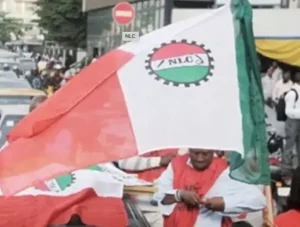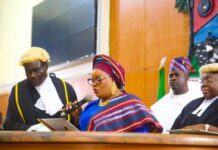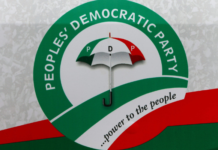May 1 came and went; and there was no announcement on National Minimum Wage – despite Organised (?) Labour’s clamour for it. Like the toothless hunting dogs they have become, Labour leaders in various states, including those not paying N30,000 per month now, were reduced to begging instead of demanding for workers’ rights to a living wage. Politicians can afford to treat Labour with the contempt they deserve because Nigerian Labour movement has become an expensive joke – which workers should not find amusing. The leadership of the largest Labour group, the Nigerian Labour Congress, NLC, is so confused; they cannot seem to decide if they are political party leaders or union men. Members of a union group are united mainly by the economic and social welfare of the workers they are elected to represent.
In my elective course on Collective Bargaining as an undergraduate studying Economics in the USA, from 1964 to 1968, I was struck by the fact that the unions, created by the left-leaning Democratic Party, were led by conservative elements; who were more Republican in their politics. While Presidents Kennedy and Johnson were pushing for more black civil rights and the right of black Americans to vote and the Affirmative Action Programme, the Labour leaders, all white, were not in support. Lyndon Johnson only got them to support his Great Society Programme from 1964-68 by granting them more powers to strike than previous governments did. Johnson offered a package from which nobody in support could remove anything. It was a matter of all or nothing. The unions have never contemplated getting directly involved in politics and the choice of flag-bearers for political parties. Every member was/is at liberty to choose for himself or herself. NLC’s involvement with the Labour party was a blunder from which it should retreat. Otherwise, it will lead workers into a blind alley in the delicate negotiations for an acceptable minimum wage.

NLC, TUC, PEGASSAN, ASUU, SANU etc represent the undesirable faces of Nigerian workers’ movements singing different tunes on the same subject. It has not occurred to all their leaders that there can only be one minimum wage for the country; not one for each union. Commonsense, which is actually not common among Nigerian leaders, would have suggested that the leaders of various unions got together to agree on a first and a fall back position which everybody must defend to the last; and damn the consequences. But, in order to arrive at those positions, dispassionate economists, accountants, financial experts should have been engaged to advise them on what can be feasible. Playing to the gallery, announcing outlandish figures, just to please the rank and file, invariably receive the response Labour is now getting.
Elected officials have ambushed a divided Labour. Governors have offered as high as N70,000 and as low asN40,000 per month. Less courageous governors have hopped on the fence. They will decide when President Tinubu announces the new minimum wage. Meanwhile, Tinubu, now certain that Labour has driven itself into a corner, first failed to announce the new wage rate on May Day. All the rallies nationwide on that day were comical rituals. There was nothing to announce to the rank and file. Second, carefully orchestrated leaks to the media have pointed to what might be announced. It is light years away from the N615,000 Labour demands. Trouble looms; as much for Labour leaders as for governments. Like most people who speak without modesty, Labour leaders will find it difficult to eat their words. Governments will also have on their hands, several hundred humiliated Labour leaders desperate to redeem their pledges to the rank and file.
Onlookers see more of a game than the players themselves. Governments and Labour are the active players in this contest which will determine whether fellow Nigerians feel more or less secured after the President makes his decision known. It is impossible for us to stay aloof from the contest which might determine our fate as a nation. The place to start is to lay out some bitter truths which Labour and governments, but Labour more, must take into consideration.
One, given the existing situation in which some states are not paying the N30,000 minimum wage to their workers, where Borno State pays primary school teachers N8,000 monthly, and several states owe arrears of salaries, expecting those states to pay N615,000 amounts to wishful thinking of the worst kind. Workers are just being led to expect what will not happen.
Two, minimum wage declarations inevitably call for salary adjustments at every level and grade in the service. Obviously, it will make no sense to pay the messenger N175,000, more than a Level 8 officer takes home and leave the salaries of senior staff untouched. Several upward adjustments will have to be made before the deal is sealed.
Three, the FG and each state will have to determine the incremental cost of paying its workers and how to source the funds on a sustainable basis. Unlike 2019, when Buhari pushed through N30,000 and had to provide bail-out to the states to secure their compliance, Tinubu, is neck deep in debt and can offer no relief to governors. For each governor, it will be a matter of take it or leave it. Most state governors will leave it if the cost is excessive. Right now, N615,000 is out of the question. Labour will best advised to develop Plan B.
Four, a few governors have mischievously increased the MW on their own. Some of their submissive workers have been reported to be grateful for the pre-emptive step. Granted, nothing stops a governor from acting on his own – especially, if his state House of Assembly has approved the measure. Problem will arise if the state’s wage is significantly out of line with the national wage agreed. Suddenly, the rank and file, now expressing gratitude will be up in arms.
Just as workers have been urged to fight on a common front, governors will also be well-advised to stick together until a national MW is announced.
Five, one self-delusive Labour leader declared that minimum wage increase will not increase inflation. Ignorance of historical precedents is one of the major faults of Nigerian leaders in all walks of life. Invariably, wage increases in the public sector ignite demands for adjustments in the private sector. Consequently prices of goods and services rise. Higher inflation follows. I challenge the speaker to point to one example anywhere in the world where this has not been the verdict of economic history. Playing to the gallery is dangerous on this matter.
Six, given the pervasive scarcity of virtually every resource — cash even in banks, food, jobs, housing, power, fuel occasionally, palliatives – it might be advisable for governments and workers to agree on a two-step wage increase. The first should start in June; and the second in November. The reason is simple. All the governments prepared their 2024 Budgets before inflation got out of control this year. There is no provision for a major wage bill adjustment. By November, they should have sorted out how to pay the new bill.




